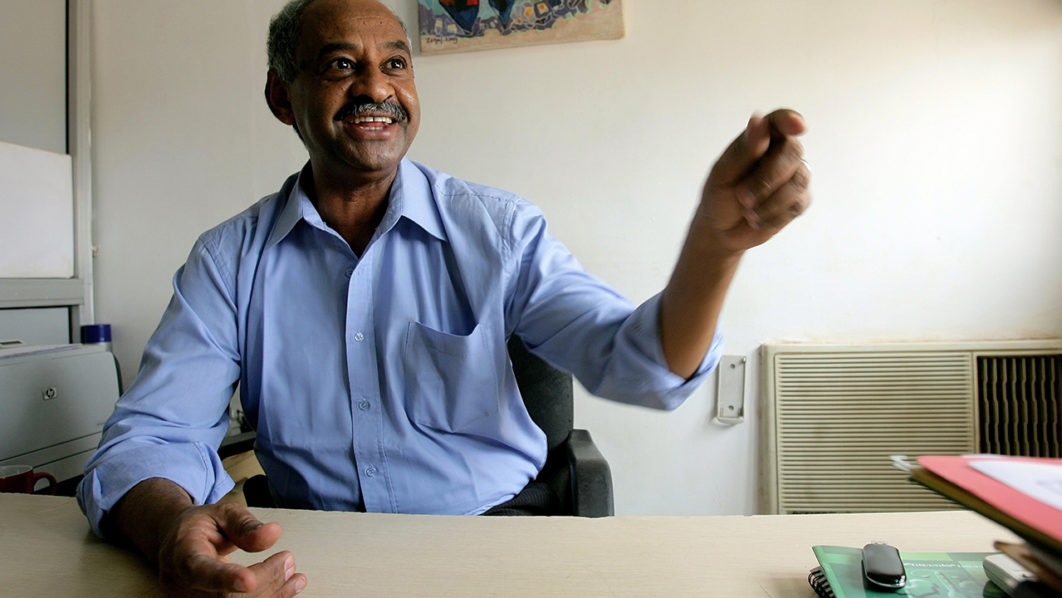 |
| (FILES) In this file photo taken on May 29, 2012, Sudanese veteran journalist and analyst Faisal Mohammed Salih speaks to the AFP during an interview in the capital Khartoum. – The prominent Sudanese journalist, who had been detained for expressing his support for anti-government protests has been freed, he told AFP on January 5. Salih, a recipient of the 2013 Peter Mackler Award for ethical and courageous journalism, had been arrested on Thursday from his office by agents of the country’s powerful National Intelligence and Security Service (NISS). (Photo by Ashraf SHAZLY / AFP) |
A prominent Sudanese journalist who had been detained for expressing his support for anti-government protests has been freed, he told AFP on Saturday.
Faisal Mohamed Salih had been arrested on Thursday from his office by agents of the country’s powerful National Intelligence and Security Service (NISS).
Salih, recipient of the 2013 Peter Mackler Award for ethical and courageous journalism, said security agents had taken him in for questioning over his views about the protests that erupted across Sudan on December 19.
“I told them that I supported the protesters as they were demonstrating peacefully, but I was not part of any group organising these protests,” Salih said.
He said he had expressed his views on several regional and international television networks in recent weeks.
“The officers wanted to know my views, and after a lot of chatting they released me at midnight,” Salih said a few hours after his release.
Salih was recognised by the Peter Mackler Award — which is named after the late Agence France-Presse reporter and editor — for defying the Sudanese government and speaking out about human rights abuses.
He was one of several journalists investigated after reporting on the alleged rape of a youth activist and has previously been imprisoned for several days for criticising the regime of President Omar al-Bashir.
Sudan is currently ranked 174th out of 180 countries in the World Press Freedom Index.
In the latest crackdown on dissent several journalists, activists and opposition leaders have been arrested by security agents trying to prevent the spread of protests.
Deadly anti-government rallies have rocked several cities including Khartoum since protests first broke out last month over a government decision to raise the price of bread.
Authorities say at least 19 people, including two security personnel, have been killed in clashes during the protests, but rights group Amnesty International has put the death toll at 37.
Sudan’s economy has deteriorated over the years, with soaring inflation of 70 percent and regular bread and fuel shortages hitting several cities.
AFP
Faisal Mohamed Salih had been arrested on Thursday from his office by agents of the country’s powerful National Intelligence and Security Service (NISS).
Salih, recipient of the 2013 Peter Mackler Award for ethical and courageous journalism, said security agents had taken him in for questioning over his views about the protests that erupted across Sudan on December 19.
“I told them that I supported the protesters as they were demonstrating peacefully, but I was not part of any group organising these protests,” Salih said.
He said he had expressed his views on several regional and international television networks in recent weeks.
“The officers wanted to know my views, and after a lot of chatting they released me at midnight,” Salih said a few hours after his release.
Salih was recognised by the Peter Mackler Award — which is named after the late Agence France-Presse reporter and editor — for defying the Sudanese government and speaking out about human rights abuses.
He was one of several journalists investigated after reporting on the alleged rape of a youth activist and has previously been imprisoned for several days for criticising the regime of President Omar al-Bashir.
Sudan is currently ranked 174th out of 180 countries in the World Press Freedom Index.
In the latest crackdown on dissent several journalists, activists and opposition leaders have been arrested by security agents trying to prevent the spread of protests.
Deadly anti-government rallies have rocked several cities including Khartoum since protests first broke out last month over a government decision to raise the price of bread.
Authorities say at least 19 people, including two security personnel, have been killed in clashes during the protests, but rights group Amnesty International has put the death toll at 37.
Sudan’s economy has deteriorated over the years, with soaring inflation of 70 percent and regular bread and fuel shortages hitting several cities.
AFP
In this article:
